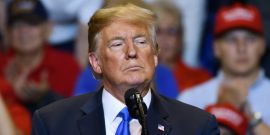How to Alienate Friends and Lose Influence
During the acrimonious decades of the Cold War, countries could be divided into three groups: those aligned with the United States; those aligned with the Soviet Union; and those aligned to neither, the so-called “non-aligned” states.
Countries in the first group often chose to refer to themselves collectively as forming “the free world,” and, when the Soviet Union collapsed in 1991, for a brief, heady moment it seemed as if the entire world might be on its way to becoming free. Or, in any event, that Russia and China might be about to join the club of nations with democratically legitimate governments. Both turned their backs on the prospect and have since preferred to go their own authoritarian ways.
Tensions between them and various countries in the free world or aspiring to become such continue to simmer, threatening at times to boil over into armed conflict (which would be a calamity for all concerned, given their nuclear capabilities). On top of these international tensions, free countries have in recent decades had to contend directly with the global resurgence of political Islam as a result of a massive and continuing flood of economic migrants and refugees from Muslim-majority countries, among whom there has been a small, but deadly, number with an implacable hatred of the cultures of their hosts.
The political culture of Western countries that has proven so obnoxious to Islamist extremists is marked by their common fealty to a pair of ideals that have become enshrined in their central political institutions and practices. These are the ideals of openness and political equality. Openness is the idea that societies should, as far as possible, be open to individual initiative, private enterprise, international trade, and freedom of exit and entry. The idea of political equality is that all of the members of a society should enjoy equal political voice, power, and standing through institutions of representative democracy and the rule of law, plus security provided through a publicly funded welfare safety net.
The countries that share this political culture are what author Bill Emmott has in mind in The Fate of the West: The Decline and Revival of the World’s Most Valuable Political Idea. For him the West, independent of countries’ geographical locations, is less a distinct region than it is the political idea that societies should, as far as possible, both be open and accord political equality to their members.
While by no means downplaying the threat the West faces today from illiberal states like China, Russia, and Iran, and from the aspirant state ISIS, Emmott considers the chief threat as coming from within. He identifies, in fact, one single person: the recently elected chief magistrate of its most powerful member. Of President Trump, Emmott writes:
How the United States of American succeeds in dealing with those issues [it faces today] will play a decisive role in determining the fate of the West . . . If it were to abandon central tenets of Westernness and its alliances with other Western countries . . . the barbarians who are at the West’s gates would applaud and conclude that the modern equivalent of the Roman Empire was about to collapse. The ideas advocated by Donald Trump represent the beginning of exactly that sort of abandonment.
Even had Trump not won in 2016, Emmott is at pains to emphasize that America would still have been beset by multifarious internal problems, as would pretty much every other country in the West. These internal problems have chiefly arisen from the effects of globalization, aging populations, and previous political settlements adopted as remedies for earlier problems which have now outlived whatever usefulness they once might have had, but which are now being clung to by vested interest groups privileged by them who are hence unwilling to give them up, such as early pensions and generous and too easily dispensed disability benefits.
All the internal problems facing the West today are, in Emmott’s view, eminently soluble, provided there is the political will to address them with the appropriate measures. Unfortunately, so he further contends, while Trump gained office promising to resolve them, the measures through which he has pledged to so would only exacerbate them and could, even if they were implemented, prove America’s and indeed the West’s undoing. These proposed remedies involve closing U.S. borders to the free movement of goods and people and withdrawing the United States from international alliances and agreements that he (nonetheless) claims have been detrimental to Americans rather than beneficial.
Were Trump to withdraw the United States from the world, contends Emmott, America would be no safer, for this would alienate its allies, many of whom would become willing, or be forced, to fall under the hegemony of Russia or China. This in turn would undermine the allies’ own openness and democratic character. America’s security thus risks being severely compromised should President Trump have his way, without its gaining any appreciable benefits for those of its citizens who have been most adversely affected by globalization—whose challenges call for an entirely different set of remedies.
Among the alternative policies he puts forward to help Americans who have been adversely affected by globalization are those designed to increase the U.S. labor-force participation rate, particularly of males with no more than a basic education. These measures would include an end to occupational licensure, which has effectively excluded from legitimate forms of employment large numbers of convicted felons, individuals who have served their time but find themselves unemployable; raising the minimum wage to make work more attractive than disability benefits, which have led many of the able-bodied to remove themselves permanently from work; and an end to the war against drugs, which has resulted in the federal conviction of legions of Americans and rendered them unemployable in the eyes of American employers.
The various measures President Trump has championed to increase the number of decently paying jobs in America are, in Emmott’s view, inappropriate as ways to accomplish that end. He urges that attention be paid to:
the impact of . . . tendencies towards protectionism and hostility to immigration on international relations. It is always tempting, during troubled times, to pick on foreigners so as to have someone else to blame. The problem is that some foreigners have a habit of picking on you, too. And to deal with such enemies, the West’s greatest asset in the past has been its friendships. The quickest way to lose those friendships would be to pick fights with each other over trade and migration.
The author is thus led to conclude The Fate of the West by issuing the following warning, primarily directed at Donald Trump:
Throughout the West, the temptation to shun collaboration and instead fight each other over trade, defence spending or environmental rules will be strong. Yet it would also be futile and would represent a renunciation of all the lessons of the post-1945 decades, during which collaboration and internationally agreed rules brought huge benefits, not least in eliminating mutually destructive competition in both war and peace . . . A great battle of ideas is under way within the West, the conclusion of which will determine our ability to revive and to continue to evolve.
Having been editor-in-chief of the Economist from 1993 to 2006, and before that that magazine’s Japan correspondent, Emmott draws on a vast knowledge of global affairs. In an atmosphere in which Germany’s Chancellor Angela Merkel declares Europe now on its own; NATO allies are dressed down over inadequate defense expenditures; and American withdrawal from a major agreement prompts the other Western signatories to declare that henceforth they will look to China for leadership on environmental issues, there is enough splintering of the West going on to make Emmott’s book well worth reading.


